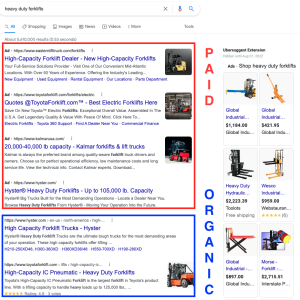Did you know that 81% of people search online before making a purchase? That means no matter what you sell—whether it’s software, industrial equipment, or sneakers—your buyers are already out there searching for a solution like yours.
The real question: are they finding you… or your competitors?
That’s where search engine optimization (SEO) comes in.
In this guide, we’ll cover what SEO is, why it’s essential in 2025, the best tools to use, and the practical steps you can take right now to grow your visibility, attract qualified buyers, and generate more leads.
What Exactly Is SEO?
At its core, SEO is about ensuring your website appears when people search for the products or services you offer.
Moz defines it as “a set of practices designed to improve the appearance and positioning of web pages in organic search results.”
In plain English: it’s optimizing your site so search engines (like Google) know what your pages are about—and users see you as a trustworthy, relevant option.
A strong SEO strategy includes things like:
- Keyword research and alignment
- Metadata and structured data
- Mobile-friendliness and page speed
- Internal and external links
- Local SEO (for businesses with physical locations)
- Accessibility (ADA compliance)
Put simply: SEO is about removing friction, adding relevance, and making your site the best possible answer to a searcher’s question.
Why SEO Is More Important Than Ever
Sure, you could just pay for ads to show up at the top of the page. But here’s the catch—paid ads disappear as soon as you stop spending.
Organic search is the long game. When you rank for the right terms, you don’t just get more traffic—you get the right traffic.
Think of it like this:
- If you sell shoes, ranking for “best summer ice cream toppings” might bring traffic. But it won’t bring buyers.
- Ranking for “best running shoes for beginners” will.
That’s the difference between vanity traffic and revenue-driving traffic.
By targeting the right keywords, you position your business in front of buyers who are already looking for what you offer.
Tools That Make SEO Easier
There are hundreds of SEO tools out there, but you don’t need them all. Here are some tried-and-true essentials we recommend:
Screaming Frog
Think of this as an x-ray for your website. Screaming Frog crawls your site and flags issues like broken links, duplicate content, or missing metadata. It even generates XML sitemaps and evaluates internal linking. Bonus: you can crawl up to 500 URLs for free.
Google Search Console
Free, powerful, and non-negotiable. GSC shows you how your site is performing in search—what keywords you rank for, how many clicks you’re getting, and where you can improve. It also alerts you to issues like server errors or indexing problems.
Ubersuggest
Created by Neil Patel, Ubersuggest is a budget-friendly keyword tool. It shows search volume, competition, and keyword ideas—plus a Chrome extension that gives you insights as you search. You can even plug in a competitor’s URL to see what they rank for.
Google Ads Keyword Planner
Even if you’re not running ads, Keyword Planner is a great way to discover keyword opportunities. You can search for ideas, filter out irrelevant terms, and build lists of high-potential queries.
Action Items You Can Do Today
Ready to put SEO into action? Start with these steps:
- Install Google Search Console. Track your site’s health, rankings, and performance—for free.
- Run a site audit with Screaming Frog. Identify quick wins like fixing broken links or updating missing metadata.
- Check your local listings. Ensure your business information (address, phone, hours) is accurate across all online platforms.
- Do keyword research. Start small: pick one page, brainstorm target terms, and use Ubersuggest and Keyword Planner to validate.
- Optimize your content. Choose 2–3 main keywords per page, then weave them naturally into titles, headers, and copy.
A Real-World SEO Win
SEO is a long-term investment. Unlike ads, you won’t see results overnight. But when you stick with it, the payoff is enormous.
Take one of our clients—a large material handling manufacturer. Their paid traffic was strong, but organic search was flat.
We focused on the basics: keyword research, metadata fixes, internal linking, and new content built around buyer-focused search terms.
Within six months, they saw:
- 45% increase in organic traffic year-over-year
- 23% increase in conversions
That’s the power of SEO done right.
Final Thoughts
SEO in 2025 isn’t about quick hacks or stuffing pages with keywords. It’s about building trust, enhancing the user experience, and positioning your business as the best solution to your buyers’ needs.
Yes, it takes time. Yes, it requires ongoing effort. But when done well, SEO drives sustainable growth that paid ads can’t match.
If you’re ready to strengthen your digital presence and start generating more qualified leads, let’s talk. Site-Seeker is here to help.